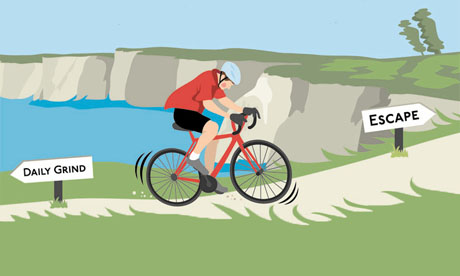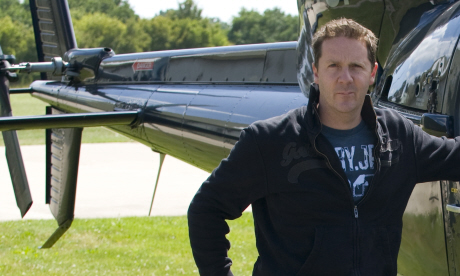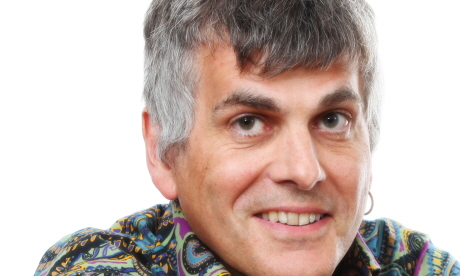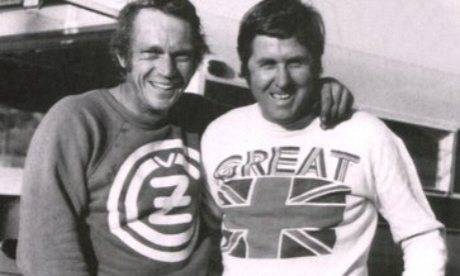
Mike Carter on his 5,000 mile, life-changing bike ride around the edge of Britain
Mike Carter needed a change. Fed up with a Britain rife with crime and sliding into economic downturn, one day he decided to cycle straight past his London office and keep going.
The result was a 5,000 mile journey around the edge of Britain. For five months he cycled, camped or relied on the hospitality of strangers, discovering a level of happiness he thought he'd lost forever.
Mike Carter speaks to Peter Moore about life beyond the daily 9 to 5 grind.
Why did you do the trip?
It was the spring of 2009, not too long after the big financial crisis. The recession was biting, police were predicting a “summer of rage”, and the newspapers seemed full of stories about how angry, divided and mean-spirited a nation we’d become. If the headlines were to be believed, Britain was crime-ridden and hopeless; a country I’ve grown up in and loved but increasingly didn’t recognise anymore.
So I decided to go and have a look for myself. The fact that the Met Office was predicting a “barbecue summer”, and I’d be travelling by bicycle, was also a selling point. Though the fact that the forecast was spectacularly wrong was a reminder that some things never change.
Previously you travelled by motorcycle. How does cycling compare?
Chalk and cheese, really. There’s a saying that “only a biker knows why a dog sticks its head out of a car window” and I think that applies to both two-wheeled modes. But whereas, cocooned inside a helmet on a motorbike, and travelling through landscapes rapidly, with the attendant roar of the engine, one can feel slightly removed from the surroundings, on a bicycle, immersed in smells and sounds, toiling up every gradient, feeling every subtle shift in the weather on your skin, you feel the journey on a much more profound and sensual level. Ernest Hemingway wrote: “It is by riding a bicycle that you learn the contours of a country best, since you have to sweat up the hills and coast down them.” And I think that’s about right.
Previously you travelled around Europe and through South America. How does Britain compare?
Well, for one, I am now even further convinced that we live on the most scenically stunning piece of land in the world. A bit damp and windy, of course, and damned hilly on a bicycle, but just jaw-droppingly beautiful. But the thing that made my round-Britain trip such a joy was the lack of language problems (readers are invited to insert their own regional joke here!). On long solo trips in countries where I can’t speak the language, I’ve sometimes found the isolation tricky, leading to loneliness and too much introspection.
For the main purpose of travel, in my opinion, is to find out about a country and its people. That’s hard when your primary means of communication is charades, and your common vocabulary limited to the words “David”, “Beckham” and “beer”.
Highlights – scenery or people?
Absolutely both. It seemed as if around every corner, there was a vista that took my breath away (literally, if it was at the top of a climb). Highlights would have to include the haunting estuarine marshes of Essex, the Northumberland coast, with its empty beaches and Arthurian castles, wild camping on the cliff tops at brooding and savage Cape Wrath, the incomparable Gower Peninsula, and the rugged coastline of Cornwall and Devon.
But the people I met on this trip, the kindness I was shown, the humour, the generosity of spirit, will probably linger longer in my memory than the actual physical highlights. I think there’s something about being on a bicycle, especially one loaded with the amount of stuff you’d normally associate with evacuees feeling a war zone, that makes people want to approach you, their curiosity piqued. It was almost as if the bicycle was the icebreaker people sought to be able to make the human connections they/we desperately want. It happened to me dozens of times daily.
“Every time I see an adult on a bicycle, I no longer despair for the future of the human race,” wrote HG Wells. And I guess that, when we can jump in a car and make distances disappear, and cocoon ourselves in a metal box impervious to the elements, and seem to have a master/servant mentality with nature, there’s something about seeing a grown-up labouring away on a bicycle that reconnects us with something precious and lost. Or maybe Britons are just nosy!
What moments will you remember from this trip?
Just about everything. The people, as I’ve said, the amazing landscapes, the unbridled joy at being outside in all weathers every day for five months, so my skin felt alive. I loved sleeping under canvas, so I went to sleep when it got dark and woke when it got light, which made me feel more simpatico with nature’s rhythms than at any other time in my life.
Then there was the feeling of physical tiredness every evening which meant the kind of sleep I’ve only ever had before under a general anaesthetic. And, because the daily 50-100 miles of cycling turned my body into some kind of eating/cycling machine, I could devour whole packets of biscuits or eat mountains of chips without feeling the tiniest sense of guilt.
Is Britain broken?
Of course not. I’ve been lucky enough to travel extensively to all corners of the planet, and I still believe we live in the greatest country in the world. But, and if I may put my political hat on here for a second, I believe that the UK, along with every other developed/developing nation pursuing this agenda of continual growth and consumption, will end up “broken” unless there’s a shift away to a more sustainable existence.
There’s the logistical argument that the planet can’t keep on supporting this madness. But there is also the emotional argument that human beings become unhappy if they’re constantly striving to want more, be more – effectively the necessary mindset that an economy predicated on continual growth must foster. On my bike trip – simplicity, pared-back existence, nature, exercise – I achieved a level of happiness I could not have imagined. But I also realise that it’s a happiness impossible to monetise and therefore of no interest to the marketers.
I fear that the planet will give up on us before we come to our senses, but when I stopped off at the Do Lectures in south Wales on my trip, and met a group of talented, visionary people who are working towards a more sustainable future, it gave me some hope that we might, just might, pull back from the abyss.
Any moments of despair?
“Melancholy,” wrote James E Starrs, “is incompatible with riding a bicycle.” I was amazed at how fortified and invincible I felt on my trip. Even when things were not going well – punctures, lunatic drivers, a group of yobs attacking my tent in the middle of the night, midge attacks – I seemed to be unfazed. It was as if I had become some bicycling Don Quixote.
The only time Sancho Panza reared his head was on the run-in to London on the last day. There, surrounded by the noise, and the anger, and the claustrophobic greyness of the big city, after five months of riding with the expanse of sea on my right shoulder, I felt a tinge of what might be called despair. I was tempted to jump on the Woolwich ferry and go round again!
Some of our readers are keen cyclists. What kind of bike did you take? And what sort of gear?
My bike was a steel-framed Ridgeback Panorama, which was really terrific. Shimano Deore XT gears and brakes. The only thing I’d change was to have some wheels custom made. I went with the stock wheels supplied with the bike, and was constantly buckling my rear wheel. Mind you, I’m a big bloke, and I was carrying a lot of gear, so maybe if I’d have eaten less biscuits and chips, the wheels would have been fine. I had four panniers – AGU – two front and two back, plus an Ortlieb dry bag for my camping gear that sat across the back rack.
Anything you wish you'd taken? Anything you wish you'd left behind?
Because I was new to cycle touring, and because I am an idiot, I took way too much stuff when I set out. I gradually got rid of much of it as I went along – it’s amazing how having to pedal up a 25% gradient can focus the mind as to what’s really necessary. That element of the trip – shedding stuff – became somehow physically and emotionally significant. By the time I got back, I was down to the bare minimum. I remember looking in my wardrobe on my first night back home and thinking: “What an earth am I doing with all this stuff!”
Were you ever tempted to turn inland? Or did having the sea on your right keep your spirits up?
The sea – its smells, sounds, its ever-shifting nature – became my much-loved companion. I would never tire of pulling over and just staring at it. It became mesmeric to me. With everything I’ve said before about the things on the trip that made me happy, I would have to say that the proximity to the vastness of the sea probably made me the happiest of all. When I cycled up the Thames estuary, and said goodbye to the sea, I felt an acute sense of grief.
Did you have an itinerary? Goals? Or was it just stick to the coast and see what happens?
Rare was the day that I had any plans. And after making the transition from a life driven by targets, and office hours, to one not really structured by anything, I felt an unbelievable freedom. So, I started looking out for opportunities. If a stranger offered me a bed for the night, or the chance to camp in their garden – which happened regularly – I might take it, or not. If, as happened at the Findhorn Foundation (an alternative lifestyle community near Inverness) or at the Do Lectures, I was invited to stay for a while, I often did. I ended up at Findhorn for a few days and at the Do Lectures for a week. But then I’d just jump back on the bike and follow the sea and see what would turn up next. Sheer joy.
At the beginning of the book you're a bit of a lost soul, contemplating running off to Argentina. Has the journey sorted you out?
Ha! Good question. Well, I never did move to Argentina. I’m really interested by the idea that a journey can “sort you out”, as if travel is some kind of “acting out”, designed to provide answers to something that might be missing. A logical conclusion here might be that once you find out what is “missing”, the need to travel will wither and die.
Well, it seems to me that we might set out with a hat-load of questions, and we may well find answers to some of them – certainly, many of the inspirational people I met on my bike ride helped me in my thinking – but if anything, we come home with even more questions. I really like Proust's quote about the purpose of travel being not necessarily to see new landscapes, but familiar landscapes through fresh eyes.
Some of us, I think, are just built to be nomads, constantly travelling, amazed by the world and its people. I don’t think it matters whether that manifests itself in moving to Argentina, riding a bike 5,000 miles around your own country, reading books, or taking a walk around your own city with your eyes wide open. It’s all travel, all driven by curiosity and a fascination with life. As long as I am breathing, I want to travel.
What’s next?
I’m trying to buy a boat at the moment, on which I hope to live on the Thames. I love the idea of watching the tide come in and out twice a day and feeling its rhythms. And I’ve just recently been travelling in Sudan for a story, with Don McCullin, the war photographer. That was one hell of an experience.
I’m hoping to start work on my third book very soon. I’m not exactly sure of the format, but it will try and tackle the perennial question of what is happiness, and ask why certain nations always score highly on the happiness scale and some don’t. Argentina has more psychoanalysts per capita than any other country, so maybe I’ll get to go there after all.
 Mike Carter is an award-winning travel writer whose work has appeared in the Observer, Sunday Telegraph, Sunday Times and Guardian.One Man and His Bike, is published by Ebury Press and you can order your copy on Amazon now.
Mike Carter is an award-winning travel writer whose work has appeared in the Observer, Sunday Telegraph, Sunday Times and Guardian.One Man and His Bike, is published by Ebury Press and you can order your copy on Amazon now.
For more travel secrets from the world's most famous wanderers, visit our Interviews page.
 Jason Hawkes: Britain From Above
Jason Hawkes: Britain From Above
Jason Hawkes on capturing Britain from a unique perspective - 2,000 ft above More
 You Are Awful: The funny side of unloved Britain
You Are Awful: The funny side of unloved Britain
Tim Moore sought out unloved Britain and was called a clown by the Mayor of Goole in the process. He tells Peter Moore why it was worth the effort More
 Barry Briggs: My Incredible Journey
Barry Briggs: My Incredible Journey
Speedway superstar Barry Briggs talks to Peter Moore about riding behind the Iron Curtain, teaching Steve McQueen a few tricks and mining for gold in Liberia More